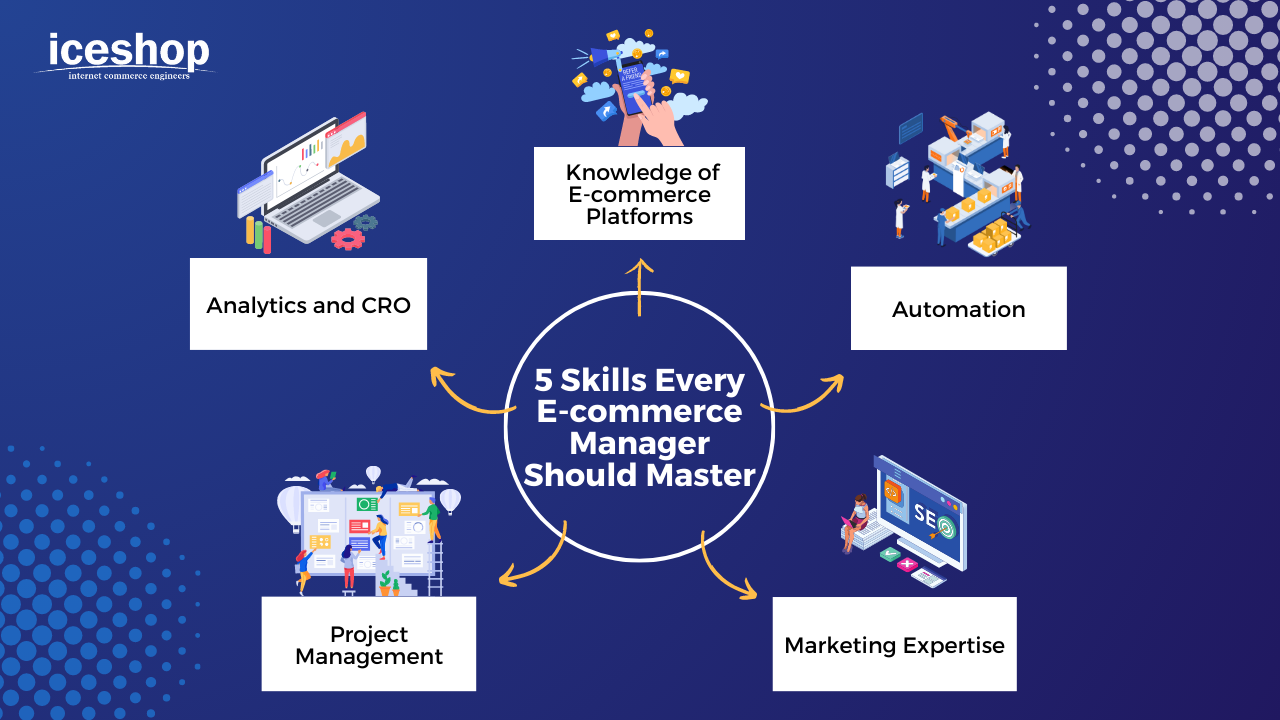In the ever-expanding world of e-commerce, businesses are witnessing unprecedented growth, with projections indicating that e-commerce sales are set to exceed the $6.169 trillion mark in 2023. As the online market continues to flourish, the demand for skilled e-commerce managers is on the rise. These professionals play a crucial role in steering e-commerce businesses toward success, and their mastery of specific skills is essential for making a real impact on the company’s growth trajectory. So, what exactly does an e-commerce manager do, and what skills are vital for excelling in this role? This article will explore the key e-commerce manager skills one should possess, the most important responsibilities of this function, and tips for hiring exceptional talent.
Understanding the Role of an E-commerce Manager
An e-commerce manager is primarily responsible for overseeing the online presence of an e-commerce site, with a focus on marketing, advertising, and content elements. They play a critical role in developing and executing online marketing plans, optimizing the e-commerce website, managing online sales, product selection, and enhancing the overall customer experience. The extent of their responsibilities may vary depending on the business’s size and nature and other team members’ presence.
Key Responsibilities of an E-commerce Manager
The day-to-day tasks of an e-commerce manager encompass a wide range of activities, each contributing to the success of the e-commerce business. Some of the common tasks include:
- Collaborating with designers and copywriters to create effective digital marketing and email campaigns, website banners, and social media content.
- Analyzing website data to identify areas for optimization, such as conversion rates, time spent on pages, drop-off rates, and cart abandonment rates.
- Strategizing and implementing various traffic acquisition channels, including search engine optimization, social media marketing, influencer marketing, pay-per-click advertising, and email campaigns.
- Regularly analyzing market trends and competitors to identify new business opportunities.
- Collaborating with programmers on web development projects to improve website speed, launch new products, and enhance user experience.
- Implementing customer retention and loyalty programs to drive repeat sales and increase customer satisfaction.
Must-Have Skills for E-commerce Managers
To excel as an e-commerce manager, individuals must possess a specific skill set that combines both technical and soft skills. Here are five must-have skills for any e-commerce manager:
1. Knowledge of E-commerce Platforms
E-commerce platforms serve as the backbone of online businesses, and a proficient e-commerce manager should have a deep understanding of various platforms such as Shopify, Magento, WooCommerce, and others. Familiarity with the chosen platform is essential for effectively managing the online store, making necessary updates, and adding new features to enhance the user experience.
Being well-versed in the technical aspects of the platform allows the e-commerce manager to collaborate efficiently with web developers and other specialists to optimize the website’s performance, ensure seamless navigation, and implement essential features like secure payment gateways.
2. Automation
In the fast-paced world of e-commerce, automation plays a pivotal role in streamlining processes and improving overall efficiency. An adept e-commerce manager must understand how to leverage automation tools and technologies to automate various aspects of the e-commerce business.
Automation can encompass a wide range of activities, including customer service automation, order tracking, inventory management, personalized customer experiences, and email marketing automation. Embracing automation saves time and effort and enables the e-commerce manager to focus on strategic initiatives and business growth.
3. Marketing Expertise
E-commerce managers are at the forefront of driving business growth, and having a solid foundation in marketing is non-negotiable. Understanding customer acquisition, engagement, and retention strategies is crucial for creating and implementing effective marketing campaigns.
To excel in customer acquisition, e-commerce managers should be well-versed in on-page SEO techniques to optimize product pages and increase organic traffic. Additionally, proficiency in social media platforms, content creation, and influencer marketing can help expand the brand’s reach and visibility.
For customer engagement, the e-commerce manager should possess an eye for design and aesthetics, enabling them to optimize conversion rate elements, conduct A/B testing, and design compelling landing pages to improve the user experience and increase conversions.
When it comes to customer retention and loyalty, the e-commerce manager should be well-equipped to strategize and execute email marketing campaigns, implement pricing strategies, and focus on conversion rate optimization (CRO) to encourage repeat purchases and increase customer lifetime value.
4. Analytics and Conversion Rate Optimization (CRO)
Data analytics and conversion rate optimization (CRO) are indispensable skills for e-commerce managers. Analyzing website data provides valuable insights into customer behavior, purchase patterns, and the effectiveness of marketing campaigns.
E-commerce managers should be proficient in using analytics tools to track key performance indicators (KPIs), understand user behavior, and identify areas for improvement. Analyzing conversion rates, cart abandonment rates, and other metrics helps pinpoint bottlenecks in the customer journey and allows for data-driven decisions to enhance the online shopping experience.
Furthermore, the ability to optimize conversion rates is crucial for increasing revenue and maximizing the return on investment (ROI) of marketing efforts. E-commerce managers should be adept at running A/B tests, conducting user surveys, and implementing changes based on data analysis to improve the website’s performance and boost conversions continuously.
5. Project Management
E-commerce managers handle multiple projects simultaneously, making project management skills vital for success in this role. Effective project management ensures smooth operations and timely delivery of tasks, from coordinating with designers and copywriters to launching marketing campaigns and website updates.
With e-commerce businesses being highly seasonal and time-sensitive, strong project management skills enable e-commerce managers to plan and execute campaigns for peak shopping seasons like Black Friday and Christmas efficiently. Experienced e-commerce managers can effectively prioritize tasks, allocate resources, and meet deadlines, ultimately contributing to the business’s growth and success.
Tips for Hiring Exceptional E-commerce Managers
Finding exceptional e-commerce manager candidates can be challenging, but the following tips will help streamline the hiring process:
1. Set Specific Goals: Define clear goals and expectations for the e-commerce manager role. Look for candidates who have demonstrated their ability to achieve similar goals in their previous experiences.
2. Ask the Right Questions: During interviews, address the specific goals you have set for the role and inquire about how candidates would handle challenges, analyze data, and present project designs. Tailor questions to assess their skills and compatibility with your business.
3. Don’t Settle for Your Niche: While familiarity with your niche is beneficial, do not limit your search to candidates with niche-specific experience. E-commerce managers possess transferable skills that allow them to adapt to various industries.
4. Examine Their Online Presence: Research candidates’ social media, LinkedIn profiles, portfolios, and previous work experiences to gain insights into their abilities and achievements.
Conclusion
In the dynamic world of e-commerce, skilled e-commerce managers are indispensable for driving business growth and success. With the right blend of technical expertise, marketing acumen, project management skills, and effective communication, e-commerce managers can lead their teams to achieve impressive results. By following the tips in this article, businesses can effectively identify and hire exceptional e-commerce managers who will significantly impact their online ventures. As the e-commerce market continues to expand, mastering these essential skills will undoubtedly be a recipe for success for any e-commerce manager.



